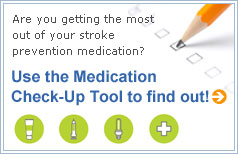Here's how your doctor can help in your fight against stroke:
| What your doctor can do |
How it helps you |
| Identify your stroke risk factors |
When you know your risk factors, you can work to control them. |
| Screen you for medical conditions that increase your risk of stroke and give you a treatment plan to help control them |
When you control these medical conditions, your stroke risk goes down. |
| Suggest healthy lifestyle changes to reduce your risk of stroke |
It's easier to get started with healthy living when you have a plan. |
| Give you regular medical check-ups |
Regular check-ups will show you whether your medical conditions and other stroke risk factors are under control. |
| Offer advice and support when you have questions or concerns |
Resolving your questions and concerns can help you stay on track with your stroke risk reduction plan. |
Talk to your doctor
about your stroke risk and how you can work together to reduce it.






